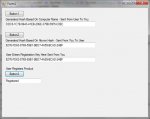garriew
Member
- Joined
- Sep 13, 2013
- Messages
- 13
- Programming Experience
- Beginner
I am wanting to require a registration code for my program to run and the code would be unqiue/locked to the machine name. Like:
Program loads, looks in INI for reg code, if there it checks to see if that code "matches" the machine name. If it does, it unlocks a feature/runs fully. If it doesn't match, registration box will show where the user can enter a code I give them to register. It will also display a unique ID that they give me so I can generate their code.
The user should also be allowed to bypass this form X times before registration is equired. I was thinking a countdown in the registry but not sure.
I don't need anything state of the art and prefer not buying a program to do it.
Any suggestions on how to do this?
Program loads, looks in INI for reg code, if there it checks to see if that code "matches" the machine name. If it does, it unlocks a feature/runs fully. If it doesn't match, registration box will show where the user can enter a code I give them to register. It will also display a unique ID that they give me so I can generate their code.
The user should also be allowed to bypass this form X times before registration is equired. I was thinking a countdown in the registry but not sure.
I don't need anything state of the art and prefer not buying a program to do it.
Any suggestions on how to do this?

